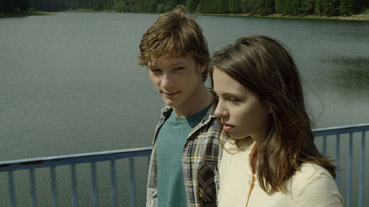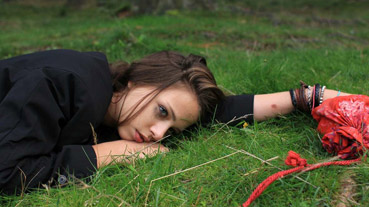|
Thoughts of several magnificent films lay behind my decision to devote a day during the London Film Festival to back-to-back screenings of the films that form the Dreileben triptych, one of the boldest German film projects of recent years. As I marked the trilogy in my diary I thought, first and foremost, of Fassbinder's 931-minute-long, 14-part adaptation of Alfred Döblin's Berlin Alexanderplatz, and Edgar Reitz's 924 minute-long, 30-episode TV film Heimat. Those films live like legends in the minds of many cinephiles, who view their respective running times as indicative of the cardinal virtues of seriousness and ambition.
Three other films informed my decision to tick off Dreileben, which created a considerable stir at the Berlinale earlier this year. Not long after that 62nd Berlin Film Festival ended, I attended a 25th anniversary screening of Claude Lanzmann's 566-minute-long holocaust documentary Shoah. We entered the Prince Charles Cinema, Leicester Square at 09:30 and left it, exhausted, at 21:30, after a brilliant Q&A with Lanzmann himself. I have equally indelible memories of watching Béla Tarr’s 450-minute-long Sátántángo over a single day in NFT2, and of a single sitting screening of Patricio Guzman’s 320-minute-long trilogy, The Battle of Chile.
In my experience, then, exceptionally long films have also tended to be extraordinarily brilliant films, so, when I first saw Dreileben in the LFF programme, a frisson of excitement ran through me. My initial exhilaration was tempered by slight disappointment, as this triple-bill clocks up a combined running time of just 266 minutes. The homogenizing 90-minute benchmark that has become increasingly standard for films leaves little room for the heightened experience of total immersion long films allow for, but I consoled myself with the thought that at least we had three 90 minutes films to tilt at. Each film could stand alone, but the films are best seen together, and the LFF programmers are to be congratulated for their decision to screen the films in one sitting, a decision vindicated by sizeable, enthusiastic audiences. Glancing around at familiar faces on the day, I estimated that at least half of those present attended all three screenings.
Dreileben’s pre-production history, as well as its length, augured well for a cinematic experience similar to those mentioned above. In the summer of 2006, prolific mainstream director Dominik Graf accused the directors of the 'Berlin School’ (a loosely connected group of auteurs with little in common) of cold-blooded formalism. Graf argued that their opposition to the narrative conventions of commercial cinema had trapped them in the art-house clichés of quasi-documentary observational realism.

Graf’s critical intervention resulted in an e-mail correspondence between himself and two prominent Berlin School directors, Christoph Hochhäusler and Christian Petzhold.* Their robust but civil debates about film aesthetics ran on for nearly two years and were published in the German film journal Revolver, co-edited by critic-cinéaste Hochhäusler. The e-mail exchanges revolved around the need for a form capable of breaking down the barriers between mainstream entertainments and films ghettoized on the festival circuit. All three confessed to feeling isolated and their exchanges ended in an agreement to transform the companionship of conversation into a collaborative film project. A year or so later, work began on Dreileben.
The driving idea behind Dreileben (which translates as "three lives") was simply that each director ad-lib around a shared narrative premise; a manhunt for a convicted murderer and sex offender who has escaped from a small town hospital into the surrounding Thuringian forest. In this way, the directors hoped, their earlier dialogue would be continued within and between the loosely connected films. And that is precisely what happens. Characters, styles and ideas slip in and out of their respective interpretations of that anchoring conceit. Watching the trilogy is like witnessing a fascinating conversation between three intoxicated individuals. What is lost in terms of coherence and sharpness of focus is gained in the passion of an exchange of ideas freed from conventional restraints.
Dreileben opens with Christian Petzold’s Etwas besseres als den Tod/Beats Being Dead. The film focuses on the fraught teenage romance between Ana (Luna Mijovic), a working class refugee from Sarajevo who works as a hotel chambermaid, and middle class student Johannes (Jacob Matschenz), who is completing alternative national service by working as a nurse in the hospital from which the murderer escapes. After Johannes rescues Ana from her self-destructive relationship with a thuggish biker, an innocent love blossoms between them. They are soon building castles in the sky and, in the film’s most moving moment, the two dance to Julie London’s jazz ballad Cry Me a River, with Johannes whispering a translation in Ana’s ear. Just as we are settling comfortably into a tender, wonderfully worked love story, Petzold flips the film on its head. The manhunt, which has thus far remained in the background, gradually comes to the fore, trailing trouble in its wake, as does Johannes’ blonde, bourgeois ex-girlfriend Sarah (Vijessna Ferkic), for whom he still carries a torch. As the film approaches its shocking and cryptic climax, an air of menace seeps into the film and their relationship. The film is part Hitchockian psychological thriller, part Horror flick and part teen melodrama. Its playful mixing of genres is typical of Dreileben.
One of the few defining features of the Berlin School was a distrust of the political and disregard for films such as Downfall, The Baader Meinhoff Complex, The Edukators and The Lives of Others. The Berlin School directors prefer to treat politics obliquely. Petzold does so in Beats Being Dead, by showing how class differences undermine Ana and Johannes’ relationship, and, he did so in his debut feature, Die Innere Sicherhe/The State I’m In, a film that features a couple of revolutionaries still on the run after 20 years but focuses on their apolitical daughter. At one point in that film, a former comrade says, "I’m through with that kind of crap." The Berlin School directors feel that way too.
Dominik Graff is equally suspicious of politics and history, though he refers to it remorselessly in conversational asides throughout the second film in the Dreileben trilogy, his Komm mir nicht nach/Don’t Follow Me Around. One of Graff’s main beefs with the Berlin School was that they displayed little interest in language. His wordy film is full of it. Johanna (Jeanette Hain), a police psychologist, is drafted in to help with the manhunt. After her hotel reservation falls through she is taken in by Vera (Susanne Wolff), a friend from her university days who, by a happy coincidence, lives in Dreileben with her husband, Bruno (Misel Maticevic), a pulp-fiction novelist. During a series of occasionally witty but generally leaden wine-fuelled evening conversations, another coincidence crops up. Johanna and Vera, we learn, once loved the same man. Who would have believed it? The film ends with another heavy-handed plot device that sees Johanna (all too easily) capture of Molesch, the absconded murder.

For all its weaknesses and clumsiness, Graff’s film is, nonetheless, an entertaining and enthralling amalgam of police procedural and ménage a trois chamber piece. Best known for his TV work, Graff is a dab hand at crime thrillers. He skillfully reveals the corruption in a local police force intent on covering up its blunders. As the local policemen close ranks, Graf deftly delineates their uncooperative, sexist attitudes to Johanna. He also handles the opening and closing scenes involving Johanna and her daughter and parents with real sensitivity. Ironically, he does so by deploying the observational style of art-house cinema that he decries. When I pressed Christoph Hochhäusler to elaborate on Graf’s criticisms of the Berlin School directors, he told me that Graf essentially wanted them "to rough up their films." And yet Don’t Follow Me Around is the neatest, most visually polished of the films. Given Graf’s TV background, it is interesting that he is the only one of the three directors who opted to shoot in film, using 16mm stock. Despite an eventual digital transfer, his film has a warmer look than the first and final films. These are striking examples of the contradictions and cross-pollination of styles that makes Dreileben such a compelling, endlessly fascinating project.
Christoph Hochhäusler brings the trilogy to a scintillating conclusion with Eine Minute Dunkel/One Minute of Darkness, brilliantly tying up the loose ends of the preceding films. In straddling the divide between Petzold’s faith in the image and Graff’s belief in language, Hochhäusler delivers the most accomplished of the three films. Hochhäusler transforms the world of Dreileben on many levels, taking it into deeper, darker physical and psychological territory. Equally hostile to social realism, he says: "You have to transform the world in order to distort it into recognisability." Having seen Aleksandr Sokurov’s majestic Mat i syn/Mother and Son at the NFT last night, I am almost persuaded by that argument, one that the Russian maestro repeated, albeit in different ways, during the In Conversation that followed the screening.
Sokurov made a couple of other comments germane to this review. He likened cinema to a child that hasn’t been taught how to behave and pointed out that there is little film can say that has not already been said in literature. In Hochhäusler’s film, based on a misreading of Schiller’s Der Verbrecher aus verlorener Ehre/The Dishonourable Irreclaimable, we meet Frank Molesch (Stefan Kurt) for the first time and find ourselves on the other end of the manhunt. Molesch too might have been an untaught child. An ill-educated social misfit or idiot savant, Molesch is traumatized by his time in the justice system and by the death of his foster mother. After his escape he staggers through the dank forest, evading the police at every turn, while slowly losing his tenuous grip on reality and sanity.
In the depths of the forest he encounters a young girl, Cleo (Parashiva Dragus), with whom he develops a warm, trusting friendship. Later, through the patient, persistent detective work of semi-retired veteran police inspector Marcus Kreil (Eberhard Kirchberg), we learn that Molesch is innocent. The "one minute of darkness" of the film’s title refers to a missing portion of the CCTV footage that provided the circumstantial evidence which condemned him. Towards the end of the film, Molesch stands at a table in the darkness of his family home, in a paroxysm of grief, as he leafs through documents and photographs contained in a box left behind for him by his recently deceased mother. As he sets light to family photographs and newspaper articles that reveal his father’s past as a persecuted trade unionist, he gives up his struggle for sanity, defeated by a horrified recognition of the parallels between his father’s experience of injustice and his own. As he burns his history and ours, the house catches fire, and Molesch flees, deranged, towards his bloody destiny at the film’s, and the trilogy’s beautiful, spectacular and unforgettable climax.
There is more to One Minute of Darkness and Dreileben than sure expertise, excellence of execution, faultless acting, inventive plotting and perfect pacing. The trilogy’s atmospheric attention to landscape and place complements the construction of credible dreamscapes, fables and metaphors. Like the individual films themselves, Dreileben is, as they say, greater than the sum of its parts. It bravely upends genre conventions, mingling often conflicting aesthetic approaches. If it frequently betrays the origins of its funding, it also has a courageous, ambitious stab at breaking down the boundaries dividing mainstream and art-house cinema. It is, inevitably, uneven, but, when taken in the round, it is magnificent. When viewed in one sitting, it was certainly one of the most enthralling cinematic experiences of the festival. Three lives, three directors, three styles, three films each containing three core characters; all of which lends the lie to the adage that two is company and three is a crowd.
*The email exchange between the three directors can be read here:
http://www.arsenal-berlin.de/fileadmin/user_upload/forum/pdf2011/forum_pdf/20113081.pdf |